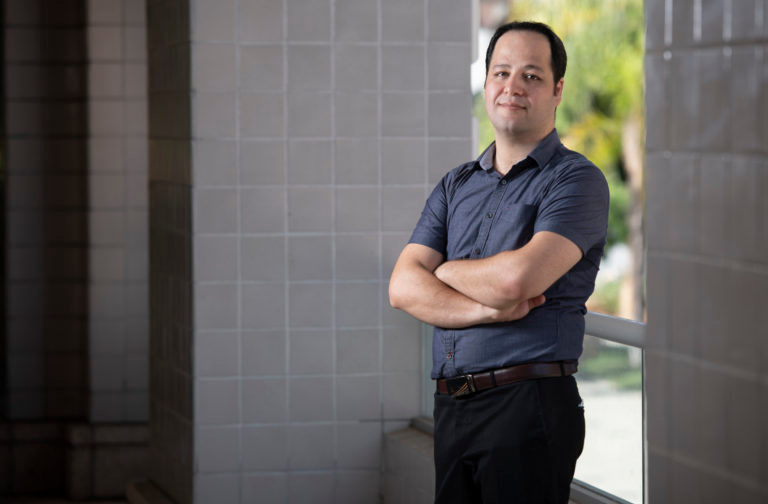Oct 8 2020
Computer scientists, electrical engineers, and biomedical engineers at the University of California, Irvine have developed a new lab-on-a-chip that can help examine tumor heterogeneity to decrease resistance to cancer treatments.
 “Our work has potential applications in single-cell studies, in tumor heterogeneity studies and, perhaps, in point-of-care cancer diagnostics—especially in developing nations where cost, constrained infrastructure and limited access to medical technologies are of the utmost importance,” says co-author Rahim Esfandyarpour, UCI assistant professor of electrical engineering and computer science as well as biomedical engineering. Image Credit: Steven Zylius/UCI.
“Our work has potential applications in single-cell studies, in tumor heterogeneity studies and, perhaps, in point-of-care cancer diagnostics—especially in developing nations where cost, constrained infrastructure and limited access to medical technologies are of the utmost importance,” says co-author Rahim Esfandyarpour, UCI assistant professor of electrical engineering and computer science as well as biomedical engineering. Image Credit: Steven Zylius/UCI.
In a paper recently published in Advanced Biosystems, the team explains how they put microfluidics, artificial intelligence, and nanoparticle inkjet printing together in a device that facilitates the inspection and differentiation of healthy tissues and cancers at the single-cell level.
Cancer cell and tumor heterogeneity can lead to increased therapeutic resistance and inconsistent outcomes for different patients.
Kushal Joshi, Study Lead Author and Former Graduate Student, Department of Biomedical Engineering, University of California, Irvine
The new innovative biochip resolves this issue by facilitating the detailed characterization of a range of cancer cells from a sample.
Single-cell analysis is essential to identify and classify cancer types and study cellular heterogeneity. It’s necessary to understand tumor initiation, progression and metastasis in order to design better cancer treatment drugs. Most of the techniques and technologies traditionally used to study cancer are sophisticated, bulky, expensive, and require highly trained operators and long preparation times.
Rahim Esfandyarpour, Study Senior Author and Assistant Professor of Electrical Engineering and Computer Science, Biomedical Engineering, University of California, Irvine
He said his team handled these challenges by integrating machine learning methods with viable microfluidics technology and inkjet printing to create economical, miniaturized biochips that are easy to prototype and can classify different cell types.
In the tool, samples move via microfluidic channels with judiciously positioned electrodes that check for variances in the electrical properties of healthy versus diseased cells in a single pass.
The UCI team’s innovation was to find a way to prototype core parts of the biochip in approximately 20 minutes by using an inkjet printer, thereby enabling effortless manufacturing in diverse locations. A majority of the materials used are reusable or, if disposable, economical.
Another feature of the invention is the integration of machine learning to handle the large volume of data the miniature tool produces. This branch of AI expedites the processing and examination of large datasets, predicting exact outcomes, detecting patterns and associations, and supporting fast and efficient decision-making.
By adding machine learning to the workflow of the biochip, the researchers have enhanced the accuracy of investigation and decreased the reliance on skilled analysts, which could make the technology attractive to medical professionals in developing nations, Esfandyarpour noted.
The World Health Organization says that nearly 60 percent of deaths from breast cancer happen because of a lack of early detection programs in countries with meager resources. Our work has potential applications in single-cell studies, in tumor heterogeneity studies and, perhaps, in point-of-care cancer diagnostics—especially in developing nations where cost, constrained infrastructure and limited access to medical technologies are of the utmost importance.
Rahim Esfandyarpour, Study Senior Author and Assistant Professor of Electrical Engineering and Computer Science and Biomedical Engineering, University of California, Irvine
This study received support from startup funding from Henry Samueli School of Engineering, UCI.
Journal Reference
Esfandyarpour, R., et al. (2020) A Machine Learning-Assisted Nanoparticle-Printed Biochip for Real-Time Single Cancer Cell Analysis. Advanced Biosystems. doi.org/10.1002/adbi.202000160.
Source: https://uci.edu